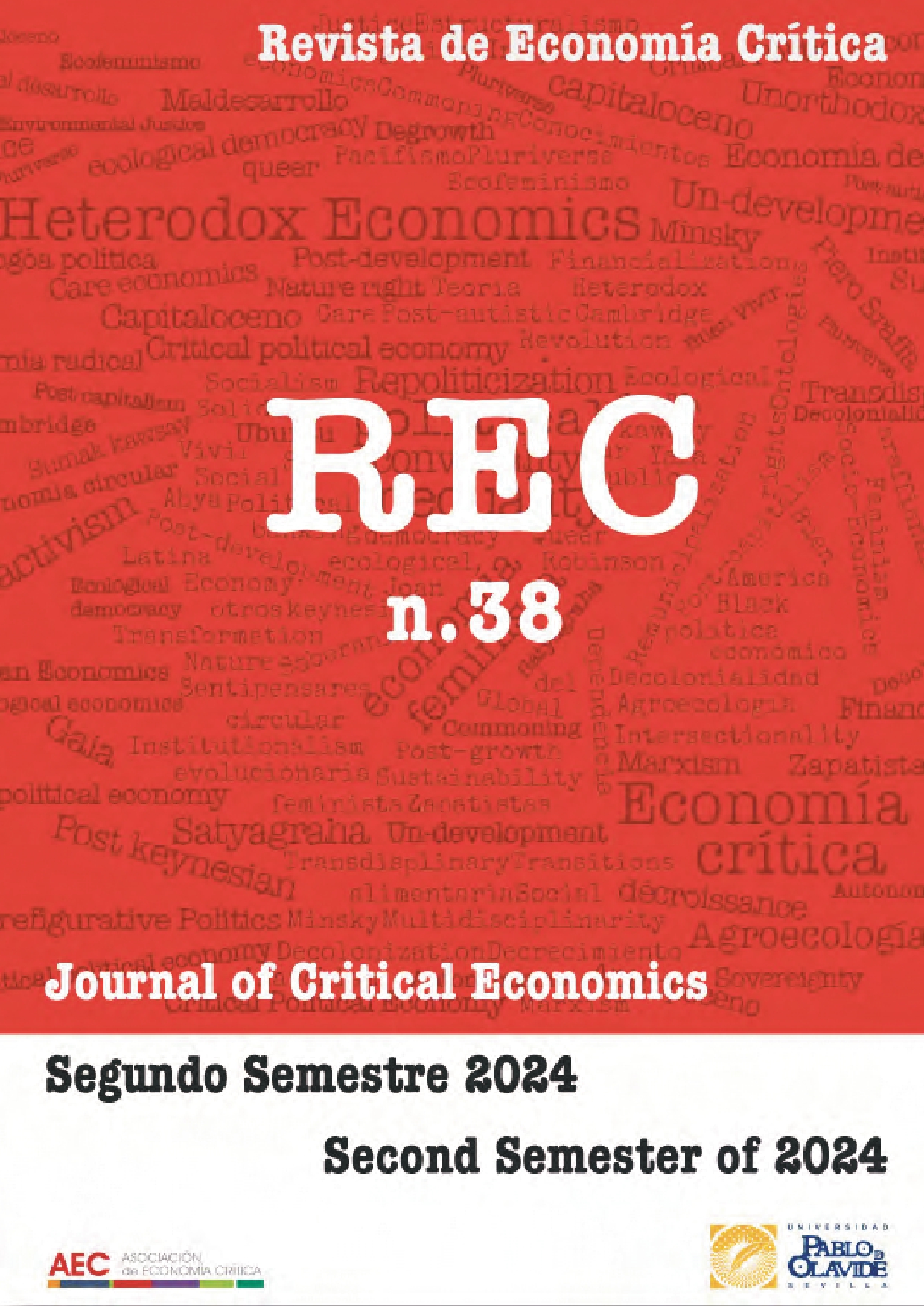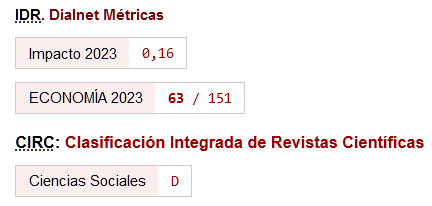The spanish energy transition as a headlong rush of capital
DOI:
https://doi.org/10.46661/rec.11168Keywords:
Energy transition, Renewable energies, capital accumulation, Accumulation by dispossession, Cheap NatureAbstract
Energy transitions constitute the main political and economic response to global warming and the depletion of fossil fuels. However, the technical and social obstacles to the viability of a green growth model force to consider the hypothesis that the massive extension of renewable energies is not motivated by environmental awareness but by the business opportunity for capital instead. This article employs the theoretical contributions of David Harvey and Jason Moore to characterize the Spanish energy transition as an exercise of accumulation by dispossession and appropriation of Cheap Nature, respectively. Through these concepts, the reasons for the critical discourse synthesized in the motto “renewable yes, but not like that” are analysed. Once the local and national economic implications are presented, an attempt is made to put them in context with the North-South structure of global capitalism. At the current point of environmental degradation, an energy transition towards “clean” sources is essential, but the one driven by capital is rather a headlong rush.
Downloads
References
Acosta, Alberto y Brand, Ulrich (2017). Salidas del laberinto capitalista: Decrecimiento y postextractivismo. Barcelona: Icaria.
Alianza Energía y Territorio (Aliente) (2022). Renovables sostenibles: fotovoltaica. Madrid: Aliente.
Bardi, Ugo (2014). Los límites del crecimiento retomados. Madrid: Los Libros de la Catarata.
Bermejo Trigo, José Luis (4 de julio de 2023). La empresa de la mina dice que su proyecto saldrá reforzado con el gobierno de PP y Vox. El Periódico de Extremadura. https://www.elperiodicoextremadura.com/caceres-local/2023/07/04/empresa-mina-dice-proyecto-saldra-89427522.html
Brockway, Paul E.; Sorrell, Steve; Semieniuk, Gregor; Heun, Matthew Kuperus; y Court, Victor (2021). Energy efficiency and economy-wide rebound effects: A review of the evidence and its implications. Renewable and Sustainable Energy Reviews, 141, 110781. https://doi.org/10.1016/j.rser.2021.110781
Bulanikian, Gisela Mariana y Boco, Alicia Noemí Rita (2022). Abriendo el debate sobre los discursos ecológicos para la descolonización de la transición energética. Encrucijadas, 22(1), a2203.
Carpintero, Óscar y Nieto, Jaime (2021). Reflexiones generales sobre la transición energética: una perspectiva de post-crecimiento. Gaceta Sindical: Reflexión y Debate, 37, 181-201.
Comisión Europea (2019). El Pacto Verde Europeo establece cómo hacer de Europa el primer continente climáticamente neutro en 2050, impulsando la economía, mejorando la salud y la calidad de vida de los ciudadanos, protegiendo la naturaleza y no dejando a nadie atrás. Unión Europea. https://ec.europa.eu/commission/presscorner/detail/es/ip_19_6691
Galeano, E. (1998). Patas arriba. Madrid: Siglo XXI.
García-Olivares, Antonio; Ballabrera-Poy, Joaquim; García-Ladona, Emili; y Turiel, Antonio (2012). A global renewable mix with proven technologies and common materials. Energy Policy, 41, 561-574. https://doi.org/10.1016/j.enpol.2011.11.018
González-Eguino, Mikel; Arto, Iñaki; Rodríguez-Zúñiga, Alejandro; García-Muros, Xaquin; Sampedro, Jon; Kratena, Kurt; Cazcarro, Ignacio; Sorman, Alevgul H.; Pizarro-Irízar, Cristina; y Sanz-Sánchez, María José (2020). Análisis de impacto del Plan Nacional Integrado de Energía y Clima (PNIEC) 2021-2030 de España. Papeles de Economía Española, 163, 9-22.
Hall, Charles A. S.; Balogh, Stephen B.; y Murphy, David J. R. (2009). What is the Minimum EROI that a Sustainable Society Must Have? Energies, 2, 25-47. https://doi.org/10.3390/en20100025
Hall, Charles A. S.; Lambert, Jessica G.; y Balogh, Stephen B. (2014). EROI of different fuels and the implications for society. Energy Policy, 64, 141-152. https://doi.org/10.1016/j.enpol.2013.05.049
Harvey, David W. (2007). El nuevo imperialismo. Tres Cantos (Madrid): Akal.
Heinberg, Richard (2017). The Energy Crisis: From Fossil Fuel Abundance to Renewable Energy Constraints. En Lerch, D. (ed.), The Community Resilience Reader: Essential Resources for an Era of Upheaval (pp. 65-78). Washington, D. C.: Island Press. https://doi.org/10.5822/978-1-61091-861-9_4
Hickel, Jason y Kallis, Giorgos (2019). Is Green Growth Possible? New Political Economy, 25(4), 469-486. https://doi.org/10.1080/13563467.2019.1598964
Huber, Matthew T. (2022). Climate Change as Class War: Building Socialism on a Warming Planet. Londres / Nueva York: Verso Books.
Intergovernmental Panel on Climate Change (IPCC) (2014). Working Group III, “Climate Change 2014: Mitigation of Climate Change”. Nueva York: Cambridge University Press. https://doi.org/10.1017/CBO9781107415416
Keyßer, Lorenz T. y Lenzen, Manfred (2021). 1.5 °C degrowth scenarios suggest the need for new mitigation pathways. Nature Communications, 12, 2676. https://doi.org/10.1038/s41467-021-22884-9
Krausmann, Fridolin; Wiedenhofer, Dominik; Lauk, Christian; Haas, Willi; Tanikawa, Hiroki; Fishman, Tomer; Miatto, Alessio; Schandl, Heinz; y Haberl, Helmut (2017). Global socioeconomic material stocks rise 23-fold over the 20th century and require half of annual resource use. Proceedings of the National Academy of Sciences of the United States of America (PNAS), 114(8), 1880-1885. https://doi.org/10.1073/pnas.1613773114
La Voz (30 de diciembre de 2022). Urbas consigue permiso para explotar la mina de feldespato de Muras. La Voz de Galicia. https://www.lavozdegalicia.es/noticia/lugo/muras/2022/12/30/urbas-consigue-permiso-explotar-mina-feldespato-muras/00031672399635864886949.htm
Lozano, Nerea (30 de agosto de 2023). Los nuevos proyectos mineros en Teruel: explotaciones que pueden contaminar agua o atravesar bienes de interés cultural. El Diario.es. https://www.eldiario.es/aragon/nuevos-proyectos-mineros-teruel-explotaciones-contaminar-agua-atravesar-bienes-interes-cultural_1_10474953.html
Malm, Andreas (2020). Capital fósil: el auge del vapor y las raíces del calentamiento global. Madrid: Capitán Swing.
Martínez Alier, Joan (2011). El ecologismo de los pobres. Conflictos ambientales y lenguajes de valoración. Barcelona: Icaria.
Moore, Jason W. (2013). El auge de la ecología-mundo capitalista (I): Las fronteras mercantiles en el auge y decadencia de la apropiación máxima. Laberinto, 38, 9-26.
Moore, Jason W. (2020). El capitalismo en la trama de la vida. Ecología y acumulación de capital. Madrid: Traficantes de Sueños.
Murphy, David J. R. y Hall, Charles A. S. (2010). Year in review-EROI or energy return on (energy) invested. Annals of the New York Academy of Sciences, 1185(1), 102-118. Doi: https://doi.org/10.1111/j.1749-6632.2009.05282.x
Orcástegui, Víctor (21 de mayo de 2023). Hectáreas y megavatios. Heraldo de Aragón. https://www.heraldo.es/noticias/opinion/2023/05/21/hectareas-y-megavatios-1653259.html
Palazuelos, Enrique (2019). El oligopolio que domina el sistema eléctrico. Madrid: Akal.
Pommeret, Aude; Ricci, Francesco; y Schubert, Katheline (2022). Critical raw materials for the energy transition. European Economic Review, 141, 103991. Doi: https://doi.org/10.1016/j.euroecorev.2021.103991
Red Eléctrica (2023). Generación renovable por tecnología/combustible (GWh) del 2018 al 2022. Red Eléctrica. https://www.ree.es/es/datos/generacion/estructura-renovables?start_date=2018-01-01T00:00&end_date=2022-12-31T23:59&time_trunc=year&systemElectric=nacional
Roca Jusmet, Jordi (2022). La política climática y los combustibles fósiles: una perspectiva desde la oferta. Revista de Economía Crítica, 34, 9-25.
Samadi, Sascha; Fischer, Andreas; y Lechternböhmer, Stefan (2023). The renewables pull effect: How regional differences in renewable energy costs could influence where industrial production is located in the future. Energy Research & Social Science, 104, 103257. Doi: https://doi.org/10.1016/j.erss.2023.103257
Sandberg, Maria; Klockars, Kristian; y Wilén, Kristoffer (2019). Green growth or degrowth? Assessing the normative justifications for environmental sustainability and economic growth through critical social theory. Journal of Cleaner Production, 206, 133-141. Doi: https://doi.org/10.1016/j.jclepro.2018.09.175
Sanz Bayón, Pablo (2019). Pobreza energética en España: aproximación jurídica y económica a sus causas y causantes. Documentación social, 3, 23-43.
Sgouridis, Sgouris; Csala, Denes; y Bardi, Ugo (2016). The sower's way: quantifying the narrowing net-energy pathways to a global energy transition. Environmental Research Letters, 11(9), 094009. Doi: 10.1088/1748-9326/11/9/094009
Smil, Vaclav (2021). Energía y civilización: una historia. Barcelona: Arpa Editores.
Solís, Elena (30 de mayo de 2019). La psicoburbuja del New Green Deal. Contrainformación. https://contrainformacion.es/la-psicoburbuja-del-new-green-deal/
Taylor, Peter J. (1981). Geographical Scales within the World-Economy Approach. Review (Fernand Braudel Center), 5 (1), 131-156.
Vadén, Tere; Lähde, Ville; Majava, Antti; Järvensivu, Paavo; Toivanen, Tero; Hakala, Emma Sofia; y Eronen, Jussi Tuomas (2020). Decoupling for ecological sustainability: A categorisation and review of research literature. Environmental Science and Policy, 112, 236-244. Doi: https://doi.org/10.1016/j.envsci.2020.06.016
Zografos, Christos y Robbins, Paul (2020). Green Sacrifice Zones, or Why a Green New Deal Cannot Ignore the Cost Shifts of Just Transitions. One Earth, 3, 543-546. https://doi.org/10.1016/j.oneear.2020.10.012
Downloads
Published
How to Cite
Issue
Section
License
Copyright (c) 2024 Álvaro Ramón Sánchez

This work is licensed under a Creative Commons Attribution 4.0 International License.
This licence allows third parties to share (copy and redistribute the material in any medium or format) and adapt (remix, transform and create from the material for any purpose, including commercial purposes), provided that authorship and first publication in this journal (The Journal, DOI of the work) is acknowledged, a link to the licence is provided, and it is stated whether changes have been made to the work.







